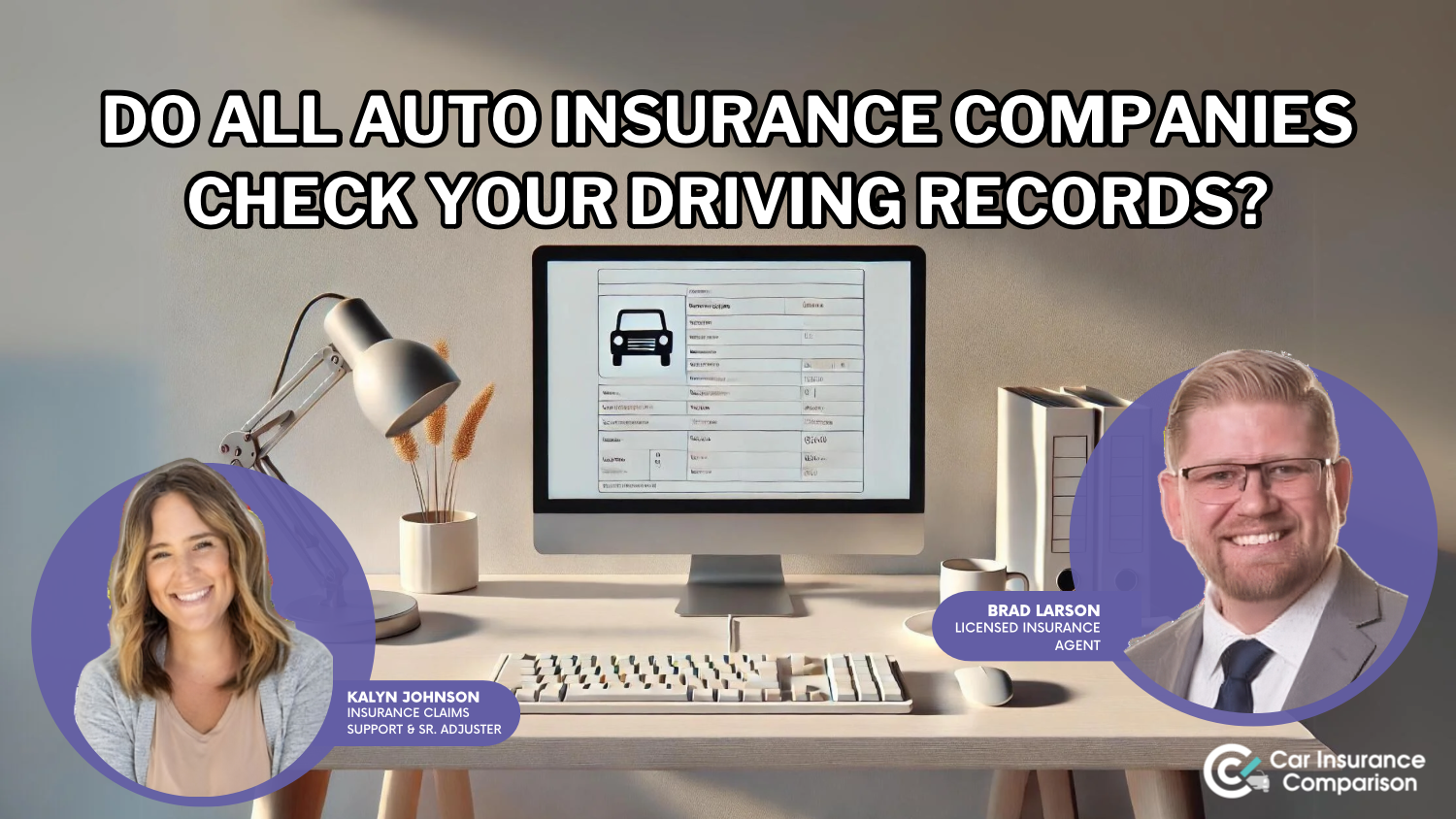Do all car insurance companies check your driving records?
All car insurance companies check driving records to determine if you are a high risk driver. High risk drivers can end up paying double for their insurance premiums.
Free Car Insurance Comparison
Compare Quotes From Top Companies and Save
Secured with SHA-256 Encryption

Brad Larson
Licensed Insurance Agent
Brad Larson has been in the insurance industry for over 16 years. He specializes in helping clients navigate the claims process, with a particular emphasis on coverage analysis. He received his bachelor’s degree from the University of Utah in Political Science. He also holds an Associate in Claims (AIC) and Associate in General Insurance (AINS) designations, as well as a Utah Property and Casual...
Licensed Insurance Agent
UPDATED: Sep 22, 2024
It’s all about you. We want to help you make the right coverage choices.
Advertiser Disclosure: We strive to help you make confident car insurance decisions. Comparison shopping should be easy. We are not affiliated with any one car insurance company and cannot guarantee quotes from any single company.
Our partnerships don’t influence our content. Our opinions are our own. To compare quotes from top car companies please enter your ZIP code above to use the free quote tool. The more quotes you compare, the more chances to save.
Editorial Guidelines: We are a free online resource for anyone interested in learning more about auto insurance. Our goal is to be an objective, third-party resource for everything auto insurance related. We update our site regularly, and all content is reviewed by auto insurance experts.
UPDATED: Sep 22, 2024
It’s all about you. We want to help you make the right coverage choices.
Advertiser Disclosure: We strive to help you make confident car insurance decisions. Comparison shopping should be easy. We are not affiliated with any one car insurance company and cannot guarantee quotes from any single company.
Our partnerships don’t influence our content. Our opinions are our own. To compare quotes from top car companies please enter your ZIP code above to use the free quote tool. The more quotes you compare, the more chances to save.
On This Page
When you request a car insurance quote, the agent or the quoting system will ask you if you have any driving infractions, moving violations or accidents in your past.While the questions that you are asked while you are trying to retrieve quotes and compare premiums might sound a bit intrusive, each and every question that is asked helps the company assign you to a risk class.The company might not be able to watch you each time you turn on your ignition, but they can see what type of driver you are by reviewing your driving history.Start comparing car insurance rates now by using our FREE tool below! Read on, and learn more about how and when your driving record can play an important role in determining your premiums.
- Car insurance rates are calculated by reviewing a household’s risk and assigning a risk class
- Know the different categories of risk and how violations can affect how companies see you
- According to car insurance companies, there are three different categories of risk for drivers
Free Car Insurance Comparison
Enter your ZIP code below to view companies that have cheap car insurance rates.
Secured with SHA-256 Encryption
What are the categories of risk and what does each class mean?

Insurance companies use a long list of more than a dozen different rating factors to determine your personalized premiums. All of these rating factors will play a role in how much you will pay for your coverage.
The single most important element that is used to calculate your premium is your driving history.
Your driving history is usually a priority when it comes to assigning you to a risk group or class. This is why you should learn more about the different classes you can be qualified for and why falling into a category is so important.Here is a breakdown of the three risk categories you can belong to:
— Preferred Risk
Preferred risk is the best category and it consists of only the safest drivers who are least likely to get into an accident.Most companies will only assign drivers to drivers who have been continuously insured for several years and who have not used their liability insurance or their collision insurance for an at-fault accident in years.
Since they are least likely to have an accident based on what the statistics say, this is the lowest priced risk.
Preferred risk drivers do not have at-fault accidents in the past 3 years, driving infractions or more than 1 not-at-fault accident. Many companies that are selling in states where credit-based insurance scores can be used will only assign preferred risk to a driver with good credit.
— Standard Risk

A standard risk driver is someone who may have moving violations or at-fault accidents within the past few years.While they do not have a perfect record, they do have an acceptable record where the standard insurer is willing to provide coverage to the driver.A majority of drivers who are licensed and have experience driving will be a standard risk driver. They will have average credit, 1 or 2 flaws on their record, but too many blemishes to be considered preferred.
— High Risk
High-risk drivers pay the highest rates because their behavior behind the wheel is likely to lead to an accident.There are many different ways someone will be classified as high risk, but the biggest cause that leads to this classification is the driving record.Having multiple at-fault accidents, numerous minor violations, major violations, very bad credit or even long gaps in your insurance coverage can lead to this classification.Some insurance companies will not even underwrite an application when the person is high risk.
How can a company review your driving record?
Now that you understand risk classes and why these classes are so important in determining your insurance rates, you might be wondering how an insurance company can actually see if you have filed a claim or if you have been cited for a violation in another state.In today’s modern day and age, insurance companies have access to all sorts of different reports that help them tell if you are painting an accurate picture of your experience.
When you go from getting a quote to filling out an application for coverage, you are giving the company permission to run these reports as the policy is being underwritten.
Without giving permission, the company will stop the underwriting phase and they will deny your application. Here are some of the reports and electronic systems that will be used as the application goes through the verification stage that is called underwriting:
— Motor Vehicle Reports
Motor Vehicle Reports, also known as MVRs, are official driving records that are reported by the Department of Motor Vehicles. The report will show the original license date, the point history, the violations, convictions dates, license status and if accidents have been reported.Most of the time, the violations, and at-fault accidents are only chargeable for a period of 3 years but the report may go back 5 years.It is important that you give prior license numbers if you are coming from another state and you want added experience credit because many states do not link this information once a license is transferred.
Read more: How far back do car insurance companies look?
— C.L.U.E. Reports

C.L.U.E., which stands for Comprehensive Loss Underwriting Exchange, is a program that insurance companies use to report losses and to communicate with one another. When a loss occurs, the claims department inputs the details into the system.When you apply for insurance, the new carrier will look for the records under your name. It is necessary to run both reports because some MVR will not show claim information. This is because not all accidents are reported to the DMV.
Make sure that you know what is on your C.L.U.E. and verify it is accurate before you start to shop for quotes.
If there is an error, you can show the error by asking the company for a Letter of Experience that shows the misprint.Insurance companies need to know what type of risk they are taking on so that they can stay profitable.If you want to shop for coverage, knowing these reports are run can help you ensure that you are disclosing all of the information that needs to be disclosed. When you get a quote with an online rating system, you can easily see how much you will pay with many companies at once.Start comparing car insurance rates now by using our FREE tool below!
Case Studies: Do all car insurance companies check your driving records?
Case Study 1: The Preferred Risk Driver
Sarah, a responsible driver with a clean driving record, fell into the preferred risk category. Insurance companies recognized her as a low-risk driver, considering her continuous insurance coverage and absence of at-fault accidents or moving violations.
As a result, Sarah enjoyed the lowest-priced insurance premiums available. Her clean driving history allowed her to secure affordable coverage while maintaining excellent risk status.
Case Study 2: The Standard Risk Driver
Michael had a few minor moving violations within the past three years, which placed him in the standard risk category. While his driving record was not perfect, it was still acceptable to insurance providers, allowing him to obtain coverage.
As a standard risk driver, Michael had average credit and one or two flaws on his record. Although his premiums were slightly higher compared to preferred risk drivers, he still enjoyed reasonable rates.
Case Study 3: The High-Risk Driver
David, unfortunately, had a history of multiple at-fault accidents and major violations, resulting in a high-risk classification. His driving record indicated a higher likelihood of future accidents and claims, making him a challenging case for insurance companies.
As a high-risk driver, David faced the highest insurance rates due to the increased risk he posed. Some insurance companies were even unwilling to underwrite his application. It was essential for David to work on improving his driving record over time to potentially transition into a lower risk category.
Frequently Asked Questions
How long do violations or accidents affect insurance rates?
Violations and accidents usually impact insurance rates for three to five years, gradually decreasing as time passes and a clean driving record is maintained.
Can I get car insurance with a high-risk driving record?
Yes, coverage is still available for high-risk drivers, although it may be more challenging to find and typically comes with higher premiums.
Do insurance companies check credit history when reviewing driving records?
Some insurance companies consider credit history as a factor in determining premiums, but this practice varies among states and insurers.
Can I remove violations or accidents from my driving record?
Violations and accidents generally remain on your driving record for a designated time, determined by state laws, and cannot be removed early in most cases.
Will my insurance rates increase with violations or accidents on my driving record?
Yes, insurance rates can increase with violations or accidents on your driving record, as they indicate higher risk of future claims.
How far back do insurance companies look at driving records?
Insurance companies typically review driving records for three to five years to evaluate recent driving history.
Free Car Insurance Comparison
Enter your ZIP code below to view companies that have cheap car insurance rates.
Secured with SHA-256 Encryption
Brad Larson
Licensed Insurance Agent
Brad Larson has been in the insurance industry for over 16 years. He specializes in helping clients navigate the claims process, with a particular emphasis on coverage analysis. He received his bachelor’s degree from the University of Utah in Political Science. He also holds an Associate in Claims (AIC) and Associate in General Insurance (AINS) designations, as well as a Utah Property and Casual...
Licensed Insurance Agent
Editorial Guidelines: We are a free online resource for anyone interested in learning more about auto insurance. Our goal is to be an objective, third-party resource for everything auto insurance related. We update our site regularly, and all content is reviewed by auto insurance experts.

